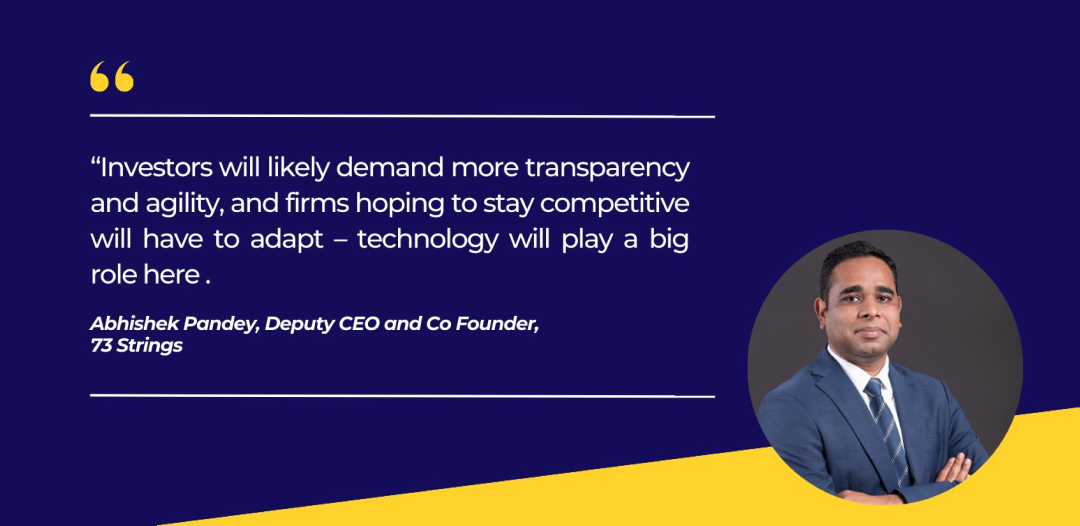Abhishek Pandey
4 min read
Private Equity Wire Insight Report:The Big Questions: Private credit in 2024 and beyond

It’s the talk of the town, and certain themes crop up in most conversations on private credit: What happens if interest rates drop, or don’t? Can portfolio companies sustain the pressure of higher-for-longer? Does private credit really pose a systemic risk?
What strategic pockets of opportunity are emerging in the market? How will banks and private lenders co-exist in the future? And what can firms do to gain a competitive edge? This report addresses the big questions.
Private Equity Wire report, “The Big Questions: Private Credit in 2024 & Beyond”, features an insightful article by our Deputy CEO, Abhishek Pandey, titled “Beyond Spreadsheets: Embracing Automation & Data-Driven Valuation in Private Credit.”
BEYOND SPREADSHEETS
Embracing automation and data-driven valuation in private credit Seldom has the safe, stable world of credit been associated with speed and agility – until now. Private credit transaction volumes have ballooned in the past 18 months or so, on the back of an already steep, decade long incline. And as LPs stream into the market with high return expectations, GPs need to view credit deployments as active, not passive investments.
“Private credit has become a core source of financing for the mid-market, in the US and worldwide, but the current valuation and monitoring process can limit its full potential. Digitiszation offers a solution to streamline the process and improve transparency and speed” says Abhishek Pandey, Co-Founder and Deputy CEO at 73 Strings.
“In an interest rate environment as volatile as right now, impact of this volatility on company’s fundamentals, and risk profile has to be to be taken into account for valuation process and monitoring on almost real time basis. The challenge for GPs is that monitoring these valuations is an overwhelming task when faced with current lending volumes in current environment – we are no more in a near zero interest rate environment and traditional approach of roll over at costs without adjustment from one quarter to the next is not working anymore.”
LPs demand a more robust approach, particularly as they grow more stringent with their investments and liquidity is increasingly in focus, says Pandey. They need to know exactly where they stand at all times, putting compliance, governance and transparency in the spotlight.
He says: “Even more so on the credit side than in equity, GPs are having to conduct frequent valuations – sometimes on a weekly or monthly basis. The conventional method is cashflow-based, for which analysis is done at the securities level. The challenge is, the process of running models for every individual security – volumes being high – is time consuming, rigid and fraught with risk of human error. The fallout can be seriously damaging for LP relationships.”
Data is core
Pandey points out how software today use AI to bring all the unstructured data into structured
format. “Managers engaged in valuation and monitoring can click into the platform and instantly access a company’s financials, compliance certificate, and other key information.
Data collection to valuation, everything is structured and streamlined so the role of the GP is just to apply human judgment, not collate the information. The result is a more efficient, cost-effective and risk-mitigated valuations and monitoring process as a whole.”
And there is value to be added to decision- making a cross the investment life cycle. “GPs have to make a number of strategic decisions when it comes to fundraising, deployment and valuations. Once all the data is gathered and structured in one place, it becomes possible to overlay analytics and artificial intelligence (AI) to produce extra insight – such as pricing, or exit timing, for instance – on both existing and new investments. Everyone wants to use AI, but the first step is to structure data correctly.”
Firms that leverage software in this way are not only better equipped to manage higher volumes, but they gain a strategic advantage and stand to improve their relationship with investors
To Download the full report click here